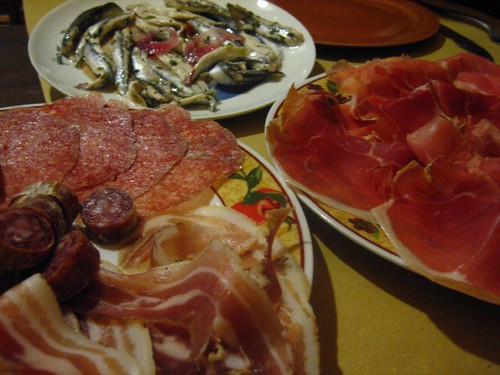
Saturday I took a major step in becoming Italian: I stopped playing fair, thought only about myself, broke the rules, and got what I wanted. I ran in the middle of the street and didn’t worry that I was pissing off the car behind me. I cut in line – in major fashion – at the film festival, elbowed my way to the front, and got one of the last tickets. And, best of all, I brought a plastic bag with me to the movies and rustled it as much as I could.
In fact, I think I’m going to repeat these activities intentionally next weekend, so as to reinforce the Italianization process. It’s still not quite natural for me: I’m starting to be rude and self-important (though still not fashionable), but I still feel guilty about it. I’m thinking that if I keep up the effort, though, I’ll be able act entirely without thinking about anyone else, with entire self-absorption, and with no Catholic guilt!
Sarcasm aside – ha! had you there! It’s almost back. – I have to go back in time a little to get back to today.
The Cineteca of Bologna is an awesome institution, and it’s always doing cool film series and hosting film festivals. (It’s the best. Every city should have a Cineteca!) Right now is the Human Rights Film Festival, and I’m trying to catch as many films as I can. I think there’s something wrong about the Human Rights Film Festival being the catalyst and place of my conversion to self-centered rudeness, but there you have it.
I went to a film the other night with my friend. Naturally, there was a line a half hour long, not because there were so many people, but because, despite the prestige and international character of the event, it was taking place in Italy and therefore had to impose a disorganization, and lines. There was a single person issuing tickets, and, this is great: You needed to buy not only a ticket for the film, but also a membership card – I told you, they’re huge! – to the Cineteca, which, interestingly, doesn’t ordinarily require a membership card. But not only that! You had to choose which type of membership card you wanted, and then determine whether you qualified for one of the discounts: Student? Member of the Food Coop? Patron of UniCredit Bank? And so on. So every single person in line got to the front, squinted at a full page of 8-point pica print describing the various membership options, and, after half an hour, stumbled away with his ticket (and brand new membership card). So then everyone got into the theater, the event started half an hour late, and the director introduced the film. They started the film, and, then – fifteen minutes later – realized that – whoops! – it’s the wrong film! (How do you get fifteen minutes into a film which the director has just introduced without realizing it’s the wrong film?) Ok, it can happen. Maybe. They stopped the film, and two of the festival directors went to the front to say, “Sorry. Wrong film.” And this was great, just classic: one director did that thing where you kind of shrug your shoulders, flop your arms out to the side, cock your head, and scrunch up half of your face, and she said, “So . . . do you guys want to continue with this film, or should we change to the scheduled film?” The 200 people in the audience were (surprisingly?) not of one mind or voice, and so the other guy repeated the question. People in the audience started shouting . . . This one! That one! Then they started negotiating: “If we play the one that’s supposed to run tomorrow today, can we play the one that’s supposed to run today tomorrow?” Just imagine if you went to the Regal to see Top Gun, and the cinema people told you, “Oh, sorry. Turns out we actually played Top Gun yesterday. Today . . . let’s see . . . yep. We’ve replaced it with Brer Rabbit and the Briar Patch. Another great film!” Actually, if the equivalent holds, it would be a beautiful, stylish, 25-year-old girl or guy telling you this, and you’d probably obediently buy a (supersized) popcorn with extra butter and settle down to an evening of Disney enjoyment. But that’s not the point. I went with an Italian friend, and his analysis of the situation was right on target: “Only in Italy! I guess this could happen anywhere. You put on the wrong film. Ok, it might happen. But only in Italy would we consult the audience and say, ‘Shoot. What do you think we should do now?’”
All this is to point out several key characteristics of Italian living: Organization is always horrendous, you always need a membership card, there will always be a line, and the people around you will always look tremendous.
Back to today, finally. It was a fantastic, full of great things. That’s the thing: It’s disorganized and there’s a line – but if you can parse your way through the disorganization and work your way to the front of the line, Italy is fantastic. The first thing I did today was attend a program at the Archeological Museum about the alimentary habits of the Etruscans, which was, naturally, followed by a tasting. (Which, also naturally, involved a long line. I’m becoming very literate: I’ve learned never to go anywhere without a book.)
The lecture was awesome, but almost as impressive was the concentration of the Rude Fashionable Old Italian Ladies. It was like an RFOIL convention. If you’re at all attentive, you can spot an RFOIL ahead of time based on visual clues, but I wasn’t so attentive upon my arrival and hence had chosen a seat located in a zone of particularly high RFOIL concentration. I knew this several minutes into the lecture when my (fairly low) aural skills started to pick up on a crinkling, which soon escalated to levels you might find in, say, a plastic bag factory. (I assume they make plastic bags in a plastic bag factory? I’ve never really thought about it before.)
The RFOIL is an Italian institution, and, as I said, she’s easy to spot. She’s an over-65, but she’s made-up to seem, say, “dating age.” This always includes pointed, high-heeled shoes, a fashion scarf, lots of makeup, and – the giveaway – an enormous fashion handbag. I use the word handbag, even though I’m not from New England, because the size of this “accessory” disqualifies it on a purely philological level from inclusion in the purse category. I want to make friends with an RFOIL so I can see what on earth goes into these handbags. As best I can tell, there are just layers and layers of plastic bags. Maybe these ladies are all on their way to the recycling center.
Of course, it’s not really just plastic bags: I know there are also a few other items. A cell phone, for example, which is never turned off, and which is programmed to sound in the middle of the concert. A few other wallets. For example, one might be for cash bills, another for coins, and another for ID cards. All together, they’re kind of like a matrioska doll. This means that, if you are at the supermarket, in line – after waiting a half hour, naturally – you will arrive at the front, and the old lady one person ahead of you will take the ol’ digging-in-the-purse-for-the-exact-change routine to a whole new level. She’ll get to the front. Wait for the cashier to tell her the bill. Surpise! Time to pay! (Oh!? Now?) She’ll dig in the handbag to find the change purse. Open it up, dig around . . . oh, no! Silly me, that’s the ID card purse. Dig around in the giant black-hole handbag some more. Pull out the wallet-purse. Dig around in the wallet-purse to pull out the (even smaller) change purse. And then dig around to find eighty-seven euro-cents, exactly.
Right, so I know there’s a cell phone and a series of purses-within-purses. There is also a supply of hard candy, all packaged in a complex telescoping (like the purses) plastic wrappers. This is how you find an RFOIL in public: You listen for the plastic wrappers. If you’re worried that your sense of hearing isn’t especially keen, or that you’ll “miss the moment” while distracted: Don’t. You can’t miss it. Once unleashed, the RFOIL will dig through her purse for the entire performance. First for the cell phone (because it’s going off right now, and playing Like a Virgin). Then for the change purse. And finally for the plastic wrapper. I mean the candy. No, on second thought, I think it actually is the plastic wrapper she’s going for. Wrap. Unwrap. Wrap. Unwrap. Deposit in purse once again. Man, does she ever get a lot of use out of that wrapper. Then she’ll decide she wants another piece of hard candy, and... . Repeat. For the entire performance, no kidding. And remember: the entire handbag is padded with plastic bags! Whoo!!! Plastic!!!
In case you’re wondering, Younger people usually skip the plastic wrappers and select from the multiple choice of other disrespectful lecture/concert/cinema behaviors, the two preferred choices being (1) talking through the entire performance, to oneself, if necessary; and (2) making out, noisily, through the entire performance.
So: Great program at the archeological museum. But lots of stupid RFOILs with plastic wrappers.
Which, finally, brings me back to the film festival. I wanted to see two consecutive films, and I figured – ah! There I go again – that I’d buy both tickets at one time. Nope. Turns out that you can buy tickets beginning only 30 minutes before the performance starts. (This is to encourage lines.) So I went to see the first film, which, naturally, started, and hence also finished, 20 minutes late. I went to get the next ticket, and, not surprisingly, there was a line that was about half an hour long.
And that’s when I became Italian! I decided that the line didn’t apply to me. An every-man-for-himself fury swept over me, I furrowed my eyebrows, and began the mission to GET WHAT I WANTED. My first effort, a bit too reasonable, was to approach a theater worker and explain that, since I was participating in the festival by attending the 6:15 screening, it was hence impossible for me to get in line early to buy a ticket for the 8:30 show, and that this didn’t make any sense and would in fact discourage people from attending the lesser-known films, and that hence she should give me a ticket without making me wait in line. (This was true, and entirely reasonable, but still, I felt downright sneaky.) She agreed that my dilemma was absurd, and that they should come up with a better system, but, “I can’t do anything, this time. Sorry.” But, no problem! I didn’t let that stop me. I’m Italian now! I scanned the crowd, found a young guy, joked around a little bit, and . . . basically inserted myself into the line right there. Which was the the front.
About 200 people got left in line. I got one of the last tickets. And that’s how I became Italian.









